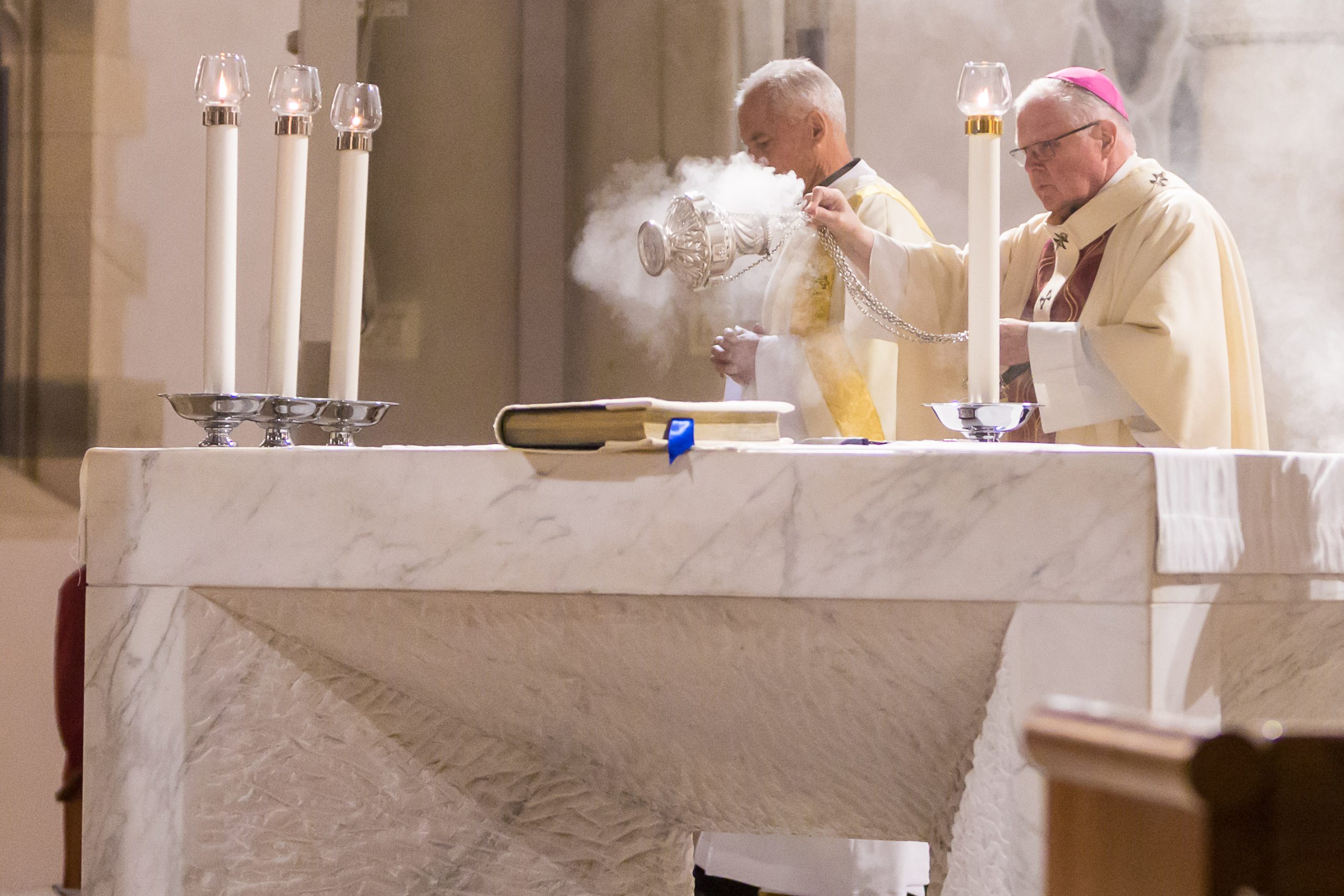Rich in tradition, the teachings and sacraments of the Church can seem mysterious at first. Here you will find information about our beliefs, practices and rituals.
God in our world
Catholics believe that God exists in our world and if we seek to discover God, we will. One of the ways that we see God in the world is through the beauty and order of nature. Catholics believe that an intelligence created the world. Consider the wonder of human birth. Could this have come about by chance?
As we search for God we come to understand that God is the creator of all that is and that it is through this understanding that we gain knowledge of God in a range of life experiences. These may be in moments of connection or aha! moments when we are aware of mystery in our lives.
The purpose of life
“We know that God causes everything to work together for the good of those who love God and are called according to his purpose for them” (Romans 8:28).
“I came that they may have life and have it abundantly” (John 10:10).
Catholics believe that the purpose of life is to have life and have it more abundantly. For this reason, we constantly try to love God with all our heart, mind and soul and to love our neighbour as ourselves.
“Why am I here?” is a question asked by people throughout the ages. Each one of us at some stage in our lives looks for true meaning and purpose in our existence. This particularly occurs when we are faced with life’s joys and its challenges of anxiety, loss and grief. God calls us to seek God, know and love God.
It is through understanding that Jesus, the Son of God, who lived on earth as a human, worked with human hands, thought with a human mind, acted by human choice, loved with a human heart and died for the forgiveness of our sins that we can begin to comprehend our reason for being.
One reason for being is to learn to love ourselves and others as God loves us – enough to give over His own Son for the love of humankind. In this way we are gradually transformed into persons who can live and love like God does, becoming ready to live and love with God forever, which brings about an internal change and a conscious relationship with God.
There are many ways to explore your relationship with God. This can be done through prayer, reading, engaging in education in faith through specific courses and/or within a faith community. Your local parish will be pleased to help you find the opportunities that are right for you, or you may wish to explore options by contacting Archdiocesan Ministries.
Faith today
“Now faith is the assurance of things hoped for, the conviction of things not seen” (Hebrews 11:1).
Faith is both a gift of God and a human act by which the believer gives personal adherence to God. It is to believe in something or someone, to fully trust and be so confident that you base your actions on what you believe.
Faith in God then, is having the kind of trust and confidence in God that leads you to commit your whole life and soul to God. Our post-modern world challenges this faith in things unseen, instead placing emphasis on realities that can be experienced through the senses and verified by scientific processes.
Instinctively, human beings know that there is more to life than briefly dancing across this earthly stage. Christian faith asserts that there is a loving creator who desires that our lives reach their ultimate fulfilment in eternity.
Faith in God develops within one’s spirit and establishes a certain inner knowing that something is so before you see any material evidence. This spiritual knowing is of the heart and soul not merely the intellect. It is a call to do and say what you believe you are called to without doubting. Faith can bring ultimate blessings as well as challenges and difficulties.
Who is Jesus?
Catholics believe that the loving presence of God has been communicated to the world in an extraordinary and definitive way through the person of Jesus Christ. He lived more than 2,000 years ago in Palestine and taught about the God’s love and plan for each and every person.
Jesus was a Jew who lived in Nazareth before he began preaching a bold message that the Kingdom of God had come upon the earth. People experienced him as a person of extraordinary love, bringing healing, hope and forgiveness of sins to those he encountered. So great was his impact on the Jewish people of his day, that the religious and political leaders of his time felt threatened and had him put to death by crucifixion.
Jesus’ death devastated his small group of followers, but after three days, Jesus appeared to them, having been raised from the dead. They experienced his living presence in a whole new way. Their lives were transformed.
They came to recognise Jesus as the Son of God, the ‘Christ’, God-with-us. While Jesus had said many times that he and the Father were one, it was not until after they experienced him as their risen Lord that they finally understood that God had been revealed to them in the person of Jesus.
These followers of Jesus, came to be known as Christians, since they went about proclaiming that the Jesus whom they knew and loved, whom they had seen crucified and whom they met after he had risen from the dead was not only the one ‘anointed by God’ (Greek – Christos) to lead human beings to fullness of life, but was indeed the Son of God.
Spirituality
Spirituality defines one’s whole way of life. As such, spirituality can be defined as a way of being, seeing and acting.
What is distinctive about Christian spirituality is that is it a way of being, seeing and acting that has its source in, and takes its inspiration from, the person and vision of Jesus Christ. It is therefore a spirituality that has its source in our communion with God and is forged in communion with others and with all of creation. It is a spirituality of relationships.
Characteristics of a Catholic Christian spirituality include:
- belief in the Trinity as the model of communion between people
- commitment to liturgy, especially the Eucharist, communal and personal prayer
- a spirit of collaboration
- an ecumenical commitment to unity
- an inclusive attitude to the world
- readiness to dialogue with all people of good will
- a passion for social justice and human rights
- a view of the natural environment as God’s creation to be loved and cared for.
Catholics understand the world as the meeting place between God’s purposes and human hopes. This view has that God’s Holy Spirit is already in the world and embraces the need to dialogue with all people of good will. These are features of a spirituality of communion and are vital aspects of the Church’s mission in the world.
Expression of spirituality
There are many different expressions of Catholic spirituality that have developed over the past two thousand years. Many of these reflect the particular charism (or spiritual gifts) of founders of religious orders who developed their own unique way of approaching God in prayer and living out the gospel.
Some examples of these different spiritualities include:
- Desert – characterised by prayer in solitude, asceticism and a life of sacrifice. St Anthony of Egypt (251-356) lived a desert spirituality, which includes centring prayer, a form of meditation on a single, sacred word that draws one closer to God.
- Benedictine – is characterised by life in community, order and obedience to superiors. St Benedict (480-550) is considered to be the father of western monasticism. Lectio Divina, is a Benedictine prayer form based on reflection on the Word of God.
- Franciscan – is characterised by a life of poverty, love of nature and giving charity to those in need. St Francis (1182-1226) rejected all of his possessions and founded a community of friars who lived in poverty and helped the poor. Franciscan prayer rejoices in God’s presence in the wonder of creation.
- Dominican – is characterised by poverty, preaching and devotion to truth. St. Dominic (1170-1221) founded the Order of Preachers to help others to deepen their relationship with Christ. The Rosary is an example of Dominican spirituality since it focuses on the mysteries of Christ’s life and is a simple way of proclaiming the truths of the faith.
- Ignatian – is characterised by examination of one’s life, discerning the will of God and living the resurrection. St Ignatius of Loyola (1491-1556) founded the Society of Jesus to teach the gospel message. The Spiritual Exercises are the Ignatian prayer form that focuses on this examination of conscience and the discernment of God’s action in one’s life.
- Carmelite – is characterised by interior detachment, silence, solitude and mystical experience. St John of the Cross (1542-1591) and St Teresa of Avila (1515-1582) were Carmelite mystics whose writings illuminate this spiritual pathway. The Dark Night of the Soul describes the need for the soul to be purified before entering into divine union with God.
- Josephite – is characterised by simplicity, perseverance and care for the poor. Saint Mary of the Cross MacKillop (1842-1909) developed a deep dependence and trust in God to carry out her many works of charity against great odds. Josephite prayer reflects this utter trust in God’s provision for what is needed to care for those in need.
Prayer
Prayer is the raising of one’s mind and heart to God or the requesting of good things from God. To pray is to respond to the wonder and mystery of life. In the Christian tradition prayer fosters a personal and living relationship with God as Trinity.
Visit Let’s Pray to pray with members of the community.
Let's Pray
We invite you to pray along with us
Join us for our weekly series where we invite you to pray along with us.
-
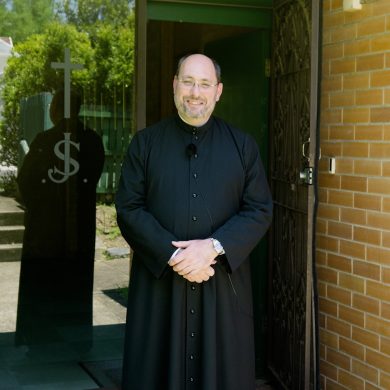
May God bless your house this Epiphany
01 Jan 2026Let’s Pray with Fr Adrian Sharp that God may bless your house this Epiphany
-
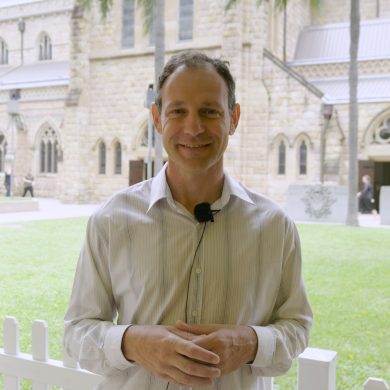
Prayer for the Holy Family of Jesus, Mary and Joseph
22 Dec 2025Let’s Pray with Shane Pianta a prayer for the Holy Family of Jesus, Mary and Joseph.
-
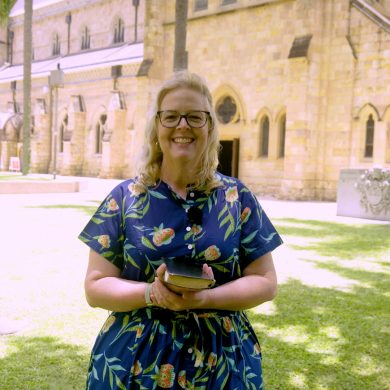
-
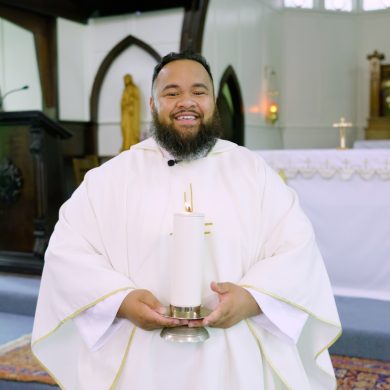
Lighting a Candle, Awakening God’s Presence
09 Dec 2025Let’s Pray with Fr William Aupito Iuliano by lighting a candle to awaken God’s presence in our lives
